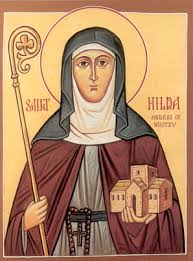
 Summary: St Hilda
Summary: St Hilda
was of the royal house of King Edwin of Northumbria and became abbess of the double monastery of men and women at Whitby. Because of the school she founded there she is honoured as a patroness of women’s education.
Even though she favoured the Celtic model of the Church, she accepted the decision of the Synod of Whitby to abide by the Roman Church practices.
Patrick Duffy tells her story.
A Christian Princess and King Edwin of Northumbria
Ethelburga of Kent was a Christian princess, who came north to marry King Edwin of Northumbria. As queen, Ethelburga had a strong Christianising influence on the thinking of her husband and his household.
Hilda baptised with the household
Hilda was an orphan who had become a member of the household of her great uncle, King Edwin. At age 13 she was baptised along with his household at Easter, 627. The ceremony was performed by the monk-bishop Paulinus, who had come from Rome to Canterbury with St Augustine and accompanied Ethelburga as she came north to marry King Edwin.
Abbess at Hartlepool
About 20 years later, Hilda was planning to join her sister as a nun at the monastery of Chelles in Paris, when St Aidan of Lindisfarne, persuaded her not to leave Britain. He gave her land on which to start her own monastery and later appointed her abbess of Hartlepool.

Remains of Whitby Abbey, founded in the 7th century by Hilda of Whitby.
Foundation at Whitby
Sometime later King Oswiu of Northumbria charged Hilda with educating his daughter and gave her the land on which she founded a double-monastery at Whitby. This comprised two communities – one male and one female – living separately but gathered together for chanting the office. This was not uncommon in Celtic monasticism.
A Wise Spiritual Director
Hilda was a wise spiritual director. She established a library and theological school and set a high standard of holiness and charity. Five of her students became bishops, two of whom – John of Beverley and Wilfred of York – are honoured as saints. Among her disciples was the cowherd Caedmon, who became a monk and teacher at the monastery and composed poems on the terrors of the last judgment, the pains of hell and the joys of heaven. Bede says of her monastery: “No one there was rich or poor, for everything was held in common and none possessed any personal property”.
The Synod of Whitby 664
The prestige of Whitby is reflected in the fact that King Oswiu chose it as the host location for the famous synod in 664 to resolve the differences between the Celtic and Roman models of Church. While Hilda herself would have preferred the Celtic practices, she accepted the Synod’s decision to implement Roman practice. The monks of Lindisfarne, by contrast, could not accept the decision; they withdrew, first to Iona and later to Ireland.
 Death and Influence
Death and Influence
Chronically ill for the last six years of her life, Hilda died in 668ad. Both Glastonbury and Gloucester claim to have her relics. She had been advisor to kings, saints, and ordinary folk.
Her abbey was destroyed by the Danish invaders in 867. After the Norman conquest of England, monks from Evesham re-founded the abbey as a Benedictine house for men and it continued until the dissolution of the monasteries by King Henry VIII in 1539. The ruined remains of the abbey is a landmark for sailors on top of the sea cliff.
A college in Oxford is named after St Hilda and she is the patroness of women’s education.
St Hilda and the Ammonites
Ammonite fossils found on the shore at Whitby are said to be the petrified remains of snakes that once infested the Whitby area. Hilda brought the infestation to an end turning the snakes into stone so as to clear a site for the building of her abbey. There are three snakestones in the arms of the town. And Hilda is often depicted holding an ammonite, or snake stone, in one hand and a model of her abbey in the other. St Hilda’s actions are immortalised in Sir Walter Scott’s poem Marmion :
When Whitby’s nuns exalting told,
Of thousand snakes, each one
Was changed into a coil of stone,
When Holy Hilda pray’d:
Themselves, without their holy ground,
Their stony folds had often found.
____________________________________
******************************
Memorable Saying for Today
‘Don’t think you are not doing what God called you to do.
If you are a woman who honours God right where you are,
you are in ministry.’
Lysa Terkeurst
******************************